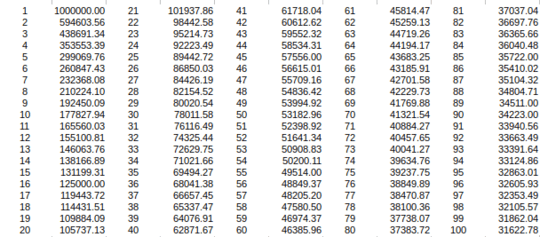229
33
As I'm applying for some jobs whose job advert doesn't state the salary, I imagined a particularly evil interviewer that would give the candidate the possibility to decide their own salary ...by "golfing" it!
So it goes simply like that:
Without using numbers, write a code that outputs the annual salary you'd like to be offered.
However, being able to write concise code is a cornerstone of this company. So they have implemented a very tight seniority ladder where
employers that write code that is b bytes long can earn a maximum of ($1'000'000) · b-0.75.
we are looking at (these are the integer parts, just for display reasons):
1 byte → $1'000'000 15 bytes → $131'199
2 bytes → $594'603 20 bytes → $105'737
3 bytes → $438'691 30 bytes → $78'011
4 bytes → $353'553 40 bytes → $62'871
10 bytes → $177'827 50 bytes → $53'182
The challenge
Write a program or function that takes no input and outputs a text containing a dollar sign ($, U+0024) and a decimal representation of a number (integer or real).
- Your code cannot contain the characters
0123456789.
In the output:
There may optionally be a single space between the dollar sign and the number.
Trailing and leading white spaces and new lines are acceptable, but any other output is forbidden.
The number must be expressed as a decimal number using only the characters
0123456789.. This excludes the use of scientific notation.Any number of decimal places are allowed.
An entry is valid if the value it outputs is not greater than ($1'000'000) · b-0.75, where b is the byte length of the source code.
Example output (the quotes should not be output)
"$ 428000" good if code is not longer than 3 bytes
"$321023.32" good if code is not longer than 4 bytes
" $ 22155.0" good if code is not longer than 160 bytes
"$ 92367.15 \n" good if code is not longer than 23 bytes
"300000 $" bad
" lorem $ 550612.89" bad
"£109824" bad
"$ -273256.21" bad
"$2.448E5" bad
The score
The value you output is your score! (Highest salary wins, of course.)
Leaderboard
Here is a Stack Snippet to generate both a regular leaderboard and an overview of winners by language.
To make sure that your answer shows up, please start your answer with a headline, using the following Markdown template:
# Language Name, $X (Y bytes)
where X is your salary and Y is the size of your submission. (The Y bytes can be anywhere in your answer.) If you improve your score, you can keep old scores in the headline, by striking them through. For instance:
# Ruby, <s>$111111.111... (18 bytes)</s> <s>$111999 (17 bytes)</s> $123456 (16 bytes)
You can also make the language name a link, which will then show up in the leaderboard snippet:
# [><>](http://esolangs.org/wiki/Fish), $126,126 (13 bytes)
var QUESTION_ID=171168,OVERRIDE_USER=77736;function answersUrl(e){return"https://api.stackexchange.com/2.2/questions/"+QUESTION_ID+"/answers?page="+e+"&pagesize=100&order=desc&sort=creation&site=codegolf&filter="+ANSWER_FILTER}function commentUrl(e,s){return"https://api.stackexchange.com/2.2/answers/"+s.join(";")+"/comments?page="+e+"&pagesize=100&order=desc&sort=creation&site=codegolf&filter="+COMMENT_FILTER}function getAnswers(){jQuery.ajax({url:answersUrl(answer_page++),method:"get",dataType:"jsonp",crossDomain:!0,success:function(e){answers.push.apply(answers,e.items),answers_hash=[],answer_ids=[],e.items.forEach(function(e){e.comments=[];var s=+e.share_link.match(/\d+/);answer_ids.push(s),answers_hash[s]=e}),e.has_more||(more_answers=!1),comment_page=1,getComments()}})}function getComments(){jQuery.ajax({url:commentUrl(comment_page++,answer_ids),method:"get",dataType:"jsonp",crossDomain:!0,success:function(e){e.items.forEach(function(e){e.owner.user_id===OVERRIDE_USER&&answers_hash[e.post_id].comments.push(e)}),e.has_more?getComments():more_answers?getAnswers():process()}})}function getAuthorName(e){return e.owner.display_name}function process(){var e=[];answers.forEach(function(s){var r=s.body.replace(/<(s|strike)>.*?<\/\1>/g,"");s.comments.forEach(function(e){OVERRIDE_REG.test(e.body)&&(r="<h1>"+e.body.replace(OVERRIDE_REG,"")+"</h1>")});var a1=r.match(SCORE_REG),a2=r.match(LANG_REG),a3=r.match(BYTES_REG);a1&&a2&&e.push({user:getAuthorName(s),size:a3?+a3[1]:0,score:+a1[1].replace(/[^\d.]/g,""),lang:a2[1],rawlang:(/<a/.test(a2[1])?jQuery(a2[1]).text():a2[1]).toLowerCase(),link:s.share_link})}),e.sort(function(e,s){var r=e.score,a=s.score;return a-r});var s={},r=1,a=null,n=1;e.forEach(function(e){e.score!=a&&(n=r),a=e.score,++r;var t=jQuery("#answer-template").html();t=t.replace("{{PLACE}}",n+".").replace("{{NAME}}",e.user).replace("{{LANGUAGE}}",e.lang).replace("{{SCORE}}","$"+e.score.toFixed(2)).replace("{{SIZE}}",e.size||"?").replace("{{LINK}}",e.link),t=jQuery(t),jQuery("#answers").append(t);s[e.rawlang]=s[e.rawlang]||e});var t=[];for(var o in s)s.hasOwnProperty(o)&&t.push(s[o]);t.sort(function(e,s){var r=e.rawlang,a=s.rawlang;return r>a?1:r<a?-1:0});for(var c=0;c<t.length;++c){var i=jQuery("#language-template").html(),o=t[c];i=i.replace("{{LANGUAGE}}",o.lang).replace("{{NAME}}",o.user).replace("{{SCORE}}","$"+o.score.toFixed(2)).replace("{{SIZE}}",o.size||"?").replace("{{LINK}}",o.link),i=jQuery(i),jQuery("#languages").append(i)}}var ANSWER_FILTER="!t)IWYnsLAZle2tQ3KqrVveCRJfxcRLe",COMMENT_FILTER="!)Q2B_A2kjfAiU78X(md6BoYk",answers=[],answers_hash,answer_ids,answer_page=1,more_answers=!0,comment_page;getAnswers();var LANG_REG=/<h\d>\s*((?:[^\n,](?!\s*\(?\d+\s*bytes))*[^\s,:-])/,BYTES_REG=/(\d+)\s*(?:<a[^>]+>|<\/a>)?\s*bytes/i,SCORE_REG=/\$\s*([\d',]+\.?\d*)/,OVERRIDE_REG=/^Override\s*header:\s*/i;body{text-align:left!important}#answer-list,#language-list{padding:10px;width:520px;float:left}table thead{font-weight:700}table td{padding:5px}<script src="https://ajax.googleapis.com/ajax/libs/jquery/2.1.1/jquery.min.js"></script> <link rel="stylesheet" type="text/css" href="//cdn.sstatic.net/codegolf/all.css?v=83c949450c8b"> <div id="answer-list"> <h2>Leaderboard</h2> <table class="answer-list"> <thead> <tr><td></td><td>Author</td><td>Language</td><td>Score</td><td>Size</td></tr></thead> <tbody id="answers"> </tbody> </table> </div><div id="language-list"> <h2>Winners by Language</h2> <table class="language-list"> <thead> <tr><td>Language</td><td>User</td><td>Score</td><td>Size</td></tr></thead> <tbody id="languages"> </tbody> </table> </div><table style="display: none"> <tbody id="answer-template"> <tr><td>{{PLACE}}</td><td>{{NAME}}</td><td>{{LANGUAGE}}</td><td>{{SCORE}}</td><td>{{SIZE}}</td><td><a href="{{LINK}}">Link</a></td></tr></tbody> </table> <table style="display: none"> <tbody id="language-template"> <tr><td>{{LANGUAGE}}</td><td>{{NAME}}</td><td>{{SCORE}}</td><td>{{SIZE}}</td><td><a href="{{LINK}}">Link</a></td></tr></tbody> </table>Edit: (rounded) maximum allowed score per byte count, for a quicker reference - text here:

61This is one of the very few (imo) successful non-fixed-output no-input non-random challenge. Unique idea! – Mr. Xcoder – 2018-08-26T00:45:50.963
would
$ 119 126be valid output? – ovs – 2018-08-26T15:52:04.730@ovs not according to the rules, no. sorry – Nicola Sap – 2018-08-26T15:56:34.830
2Nice challenge! Can we output a fully formatted currency value, if desired? Like
$80,662.67instead of$80662.6659? Your rules seems to preclude the comma, which means I couldn't use any built-in currency functions. – BradC – 2018-08-27T19:07:03.7536
I hope you don't mind, I've added a variation of the Leaderboard Snippet that sorts by score instead of bytes. Excellent first challenge!
– ETHproductions – 2018-08-27T19:27:00.0379Just noticed the new contributor tag. Well-constructed challenge, with such a high upvote and a vast amount of answers in only a few days, I wonder if this could be eligible for this years' Rookie of The Year ;) – Shieru Asakoto – 2018-08-28T11:21:11.460
Congratulations on acquiring 2 gold badges! – Jonathan Allan – 2018-08-30T15:23:57.237
2
I've nominated this challenge as a candidate for "Rookie of the Year - Challenges" category in Best of PPCG 2018 as I said back then.
– Shieru Asakoto – 2019-02-08T08:22:22.770